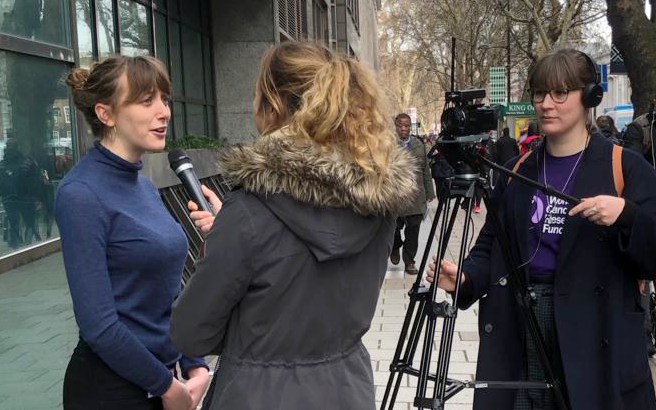 What do people really think about healthy living and the causes of cancer? Sidonie Sakula-Barry, from our Health Information Team, took to the streets and surveyed the nation to find out. And she has practical tips for everyone on how to change our less healthy behaviours.
What do people really think about healthy living and the causes of cancer? Sidonie Sakula-Barry, from our Health Information Team, took to the streets and surveyed the nation to find out. And she has practical tips for everyone on how to change our less healthy behaviours.
We wanted to find out about people’s awareness of cancer prevention, where they get their information from and what would help them to be healthier. So, we commissioned a YouGov survey and also took to the streets to ask people what they think. This is what we found out.
“I think there are so many different causes of cancer and the media seem to come up with a new one every week”
Many people mentioned the headlines and, specifically, how off-putting it is to have so much conflicting information. Yet, when asked where they got their information from, people predominantly relied on the media or word of mouth, and didn’t have a trusted source to go to. In our YouGov survey, only 62 per cent of people knew that eating a poor diet increases their risk of cancer. This fell to 58 per cent in people over the age of 55.
What you can you do: use World Cancer Research Fund (WCRF) resources as your trusted evidence base
“I wouldn’t say I’m a cancer aficionado”
The media will often report on new cancer research and findings that come out of one study without any context or future implications. WCRF is the leading authority on cancer prevention through lifestyle choices, so you can be sure that our easy-to-understand and practical advice is based on the most up-to-date and thorough research – we don’t make judgements based on only one study.
“I think it’s making small changes and not having a great big grand plan”
In general, people know that healthy lifestyles are better for them. Most people we interviewed wanted to be healthier – but it seemed like a daunting task. Our YouGov survey found that despite being most at risk, over-55s were less likely to want to live a healthier life than younger age groups. But it’s never too late to start making healthy choices!
What you can do: take small steps
Making healthy changes to your lifestyle, particularly around losing weight, is often not sustainable if they’re drastic changes. Sometimes cutting down is more manageable than quitting. So, start with small, achievable short-term goals, then think about your medium and long-term goals. For example, setting the short-term goal to use our recipes website twice this week could help you include more fibre and less processed meat in your diet.
“It’s more expensive to eat healthily”
Most people felt that cheaper healthy food options and gym memberships would help them have a healthier lifestyle.
What you can do: make food swaps in your weekly shop
Cooking a nutritious meal doesn’t have to be expensive. If you’re finding red meat is adding to your receipt, try replacing with pulses such as lentils and chickpeas. This can mean a cheaper weekly shop and will reduce your risk of cancer.
Being active doesn’t have to mean going to the gym – see where you can fit activity into your everyday life, such as in travel, work, home or leisure time. Simply walking more will help protect you against cancer.
“Every social event pressurises you into drinking a lot”
Lots of people said they drink alcohol but would like to cut down – and said it’s the social pressure of our drinking culture that makes them drink more. Many also said they would consider cutting down after hearing that alcohol causes cancer.
What you can do: use practical tips to help you drink less
Consider ways to cut down that don’t exclude you from socialising, including alternating between alcoholic and non-alcoholic drinks. Write down the short-term benefits of cutting down alcohol, such as saving money or having fewer hangovers.


